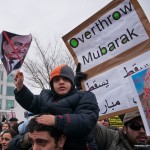Audrey Chang Moy was not the piano prodigy that her mother hoped she would be. But she practiced every day for eight years, from the age of eight to 16.
“I would practice for exactly 45 minutes and slam the cover down, even when it was in the middle of a song,” said Moy, a native of Los Angeles whose parents are from Taiwan.
“Just to make it clear that I was practicing for my mother,” she said.
Moy’s experience doesn’t come close to what Amy Chua described in her controversial essay, “Why Chinese Mothers Are Superior” published in the Wall Street Journal. In Chua’s essay, practicing for one hour is a piece of cake. It’s only considered tough when you get to hours two and three.
Even so, “I can relate to Amy Chua’s daughters,” said Moy, jokingly. “I wasn’t allowed to have any play-date or sleepover.”
Chua’s essay, which has received more than 7,500 comments, has been the topic of countless blogs (including Fi2W) and reports in other media outlets, drawing mixed reviews. It is an excerpt from her new book “Battle Hymn of the Tiger Mother,” which was released just three days after the excerpt in the WSJ and is currently ranked number six on Amazon’s bestsellers list.
The essay generated an overwhelming response, particularly from the Chinese American community. Moy said her first reaction was, “Is this for real?” as it was for many of her fellow Chinese Americans.
“I was like, is this fictional? Is she exaggerating?” said Moy.
Despite Chua’s essay title, it is impossible to generalize the Chinese American experience, as the community is truly diverse, socially and economically. The 2007 American Community Survey showed that Chinese Americans make up about 1.2 percent of the entire U.S. population.
Jennifer Chen moved to New York with her family at the age of 13 from Guangdong, China. She is a member of the so-called “1.5 Generation,” meaning people who immigrated in or before their teen years, bringing with them characteristics from their home country but who assimilated in the U.S.
Unlike Moy’s parents, who both received higher education and have white-collar professions, Chen’s father worked in a restaurant while her mother worked in a garment factory. She said her parents had little time to take care of their children and relied on her to supervise her younger brother.
“When I was going to school in China, education was pretty much the only option,” said Chen. She eventually graduated from Barnard College and went on to earn a doctorate in education from Harvard. “I was very self-motivated.”
Both Moy and Chen agreed that education is important in Chinese culture. The roots are in Chinese tradition, said Chen, who studies education trends in China, and is now an education professor at Kean University in New Jersey.
“In order to succeed on the elite level, you need to compete in different levels of examinations to be a scholar,” said Chen. “So scholars have always been treated with respect.”
But she added that with western and other influences in present day China, success can be defined differently—by wealth for instance.
“People now see other avenues for success, but the majority of the Chinese still see education as the key to upward mobility,” said Chen.
Although she called herself a “mouse mother” because she was born in the Year of Rat, even Moy has shown signs being of a “Tiger Mom” by insisting on sending her eldest son to a math class at Kumon, a learning center focusing on reading and math.
“I didn’t ask him if he wanted to go, I just take him. And he hates it!” said Moy, who has two sons. “That’s something that I kind of instilled in him…Mom knows best. I’m just gonna put you in what I think you need.”
That emphasis on study habits was influenced by her parents, said Moy. “You can’t just slack off. Slackers don’t get anywhere in life. You have to always do your best in whatever you are doing.” As Chua described in her essay, the focus on education often continues through second-generation Chinese American families.
Chen, who has a daughter and is pregnant with her second child, said she tries to find a balance between an authoritative style and high level of love and support.
“The best thing is to earn your child’s respect,” said Chen. “I tell my daughter: ‘I listen to you, and you listen to me.’ Mutual respect is so important. Otherwise, you can engage in a power struggle.” She recommended that parents establish mutual respect as early as their child’s infancy.
“Don’t underestimate children and their ability to understand things, even infants,” said Chen. “They can feel things. And the feelings can carry a long way.”
Chua admitted her book is a memoir documenting her own experience of raising her kids, not a parenting guide. And both Moy and Chen admired Chua’s courage to write the essay.
Moy said she could understand where Chua was coming from.
“She just wants the best for her kids, and nothing but the best,” said Moy. “That’s how she was raised as well.”
“It was very provocative,” said Chen. “She probably knew it would generate a lot of discussions.”
Chen said she is thankful for her bi-cultural background, which made her understand both western and eastern parenting styles and educational systems more easily.
“Having spent 13 years in the Chinese educational system and later coming here, I am able to combine the best of two worlds in a way,” said Chen.
As for Moy, who has a master’s degree in child psychology, she said she is determined to raise her kids in her own way, but she also credits her parents for raising her the way they did.
“Now I look back and I am actually kind of grateful for the way my mom raised me,” said Moy. “But was there some borderline abuse like Amy Chua? Sure. Who doesn’t have those moments in their childhood? Maybe a lot of people don’t, but they are not Chinese!” she said, laughing.
Larry Tung is a Feet in Two Worlds LGBT reporting fellow. His work, and the work of other Fi2W fellows, is supported by the New York Community Trust and the John S. and James L. Knight Foundation with additional support from the Mertz Gilmore Foundation.





